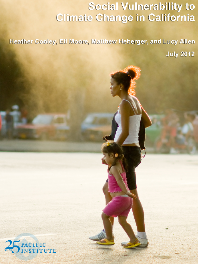Study looks into social vulnerability to climate change impacts in the State of California


The Pacific Institute has published a study that investigates social vulnerability by groups to climate change impacts, and combines this information with projected climatic exposure, hoping to support targeted and socially sensitive policies as well as most effective adaptation pathways.
The research team developed a social vulnerability index consisting of 19 variables – understanding that much information is available on physical impacts, yet a gap exists as to how these may affect different social groups.
Social groups in particularly vulnerable circumstances and locations will frequently need dedicated support to adapt to climate perturbations. It is therefore imperative for authorities at the national and regional (federal) levels, but also at the level closest to citizens, to acknowledge, and identify where vulnerabilities occur in order to deliver appropriate action. The local level plays a crucial role considering that climate change adaptation is a highly context-specific affair.
Read the full report here.
Source: Cooley, H., E. Moore, M. Heberger, and L. Allen (Pacific Institute). 2012. Social Vulnerability toClimate Change in California. California Energy Commission. Publication Number: CEC‐500‐2012‐013.
(0) Comments
There is no content